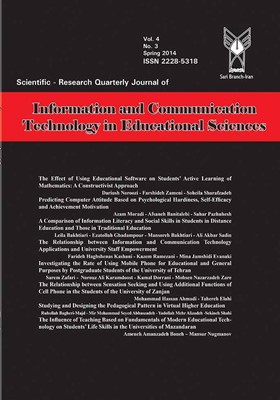The Influence of Teaching Based on Fundamentals of Modern Educational Technology on Students’ Life Skills in the Universities of Mazandaran
Subject Areas :
Infomartion Technology
Ameneh Amanzadeh Boneh
1
*
,
Mansur Nugmanov
2
1 - Ph.D. Student of Instructional Technology, State University, Dushanbe, Tajikistan
2 - Full Professor, Department of Educational Science, State University, Dushanbe, Tajikistan
Received: 2014-01-29
Accepted : 2013-11-01
Published : 2014-05-01
Keywords:
students,
mobile learning,
modern educational technologies,
web-based training,
computer learning,
life skills,
Abstract :
The goal of this study was to investigate the influence of fundamentals of modern educational technology training on students’ life skills in universities of Mazandaran Province. Considering the objective, it was a practical research, and considering the method, it was a semi-experimental procedure with pretest/posttest and control group. The statistical population included all university students in academic year of 2012-2013 (n=312586). Using cluster random sampling method, three colleges were selected, and using stratified random sampling method with optimum ratio allocation, a number of 50 individuals were selected as sample and placed in the test and control groups. Data collection tool was a researcher made questionnaire that contained 45 questions and four skill dimensions (decision making, problem solving, critical thinking and creative thinking). The face and content validity were approved by faculty advisors and reliability was calculated 0.86 using Cronbach's alpha coefficient. Data analysis was performed using covariance analysis test and t test. Findings showed that the fundamentals of modern educational technology (web-based training, computer and mobile learning) had a significant effect on life skills (decision making, problem solving, critical thinking and creative thinking). Also, there was no significant difference between modern educational technology impacts on students' life skills based on their gender.
References:
Agharkakoli, R., Safari, N., & Hafezi, H. (2011). Study of information technology training and communication functions effects on critical thinking and middle first year girl students views in Tehran 4 district. Research in Curriculum Planning, 8(31), 36-49. (in Persian).
Bahari, F. (2010). ICT knowledge relation of Neka city primary school directors with sdudents creativity. M.A. thesis, Islamic Azad University, Sari Branch. (in Persian).
Bob, L., & Roisin, D. (2010). Using podcasts to support communication skills development: A case study for content format preferences among postgraduate research students. Computers and Education, 54(4), 962-971.
Erawan, P. (2010). Developing life skills scale for high school students through mixed methods research. European Journal of Scientific Research, 47(2), 169-86.
Fazli, H. (2011). Study of information technology training courses effect on improving group staffs function of Mazandaran Medical Science University. Thesis for M.A. degree. Islamic Azad University, Sari Branch. (in Persian).
Golafshani Joybari, Gh. (2010). Basics of modern technology and public relations management in the third millennium. Sari: Asre Mandegar Publication. (in Persian).
Gorji Karsami, A. (2010). Study of internet training media effect on critical thoughts of young people in Sari. Social Deputy of Mazandaran Disciplinary Commandership. (in Persian).
Hadjerrouit, S. (2010). Developing web-based learning resources in school education: A user-centered approach. Interdisciplinary Journal of E-Learning and Learning Objects,6, 115-135.
Kirkwood, A., & Price, L. (2005). Learners and learning in the twenty-first Century: What do we know about students attitudes towards and experiences of information and communication technologies that will help us design courses. Studies in Higher Education, 30(3), 65-53.
Martin, I., & Jones, D. (2009). Exploring the life skills needs of British adolescent athletes. Psychology of Sport and Exercise, 10(1), 159-167.
Moafi, H. (2010). Study of relation between information and communication technology students and training organization staffs creativity. M.A. Thesis. Islamic Azad University, Sari Branch. (in Persian).
Motamdi Talavaki, M. T., & Ahmadi, M. R. (2007). Applying new patterns of teaching in primary school period. Tehran: Roshd Andisheh. (in Persian).
Naseri, H. (2005). Guidelines for the plan of training life skills. Tehran: Cultural Affairs Deputy and Prevention of Country Welfare. (in Persian).
Niazazari, K., Amouie, F., Maddah, M. T, & Brimani, A. (2010). Evalution of life skills of Islamic Azad University students of Sari Branch. Educational Psychology, 1(3), 33-43. (in Persian).
Rastgo, A., Naderi, E., Shariatmadari, A., & Seif Naraghi, M. (2010). Study of Internet information literacy training effect on students issues solation skills. New Approaches in Educational Administration, 1(4), 1-22. (in Persian).
Salehi, M., Gholtash, A., & Azadmehr, A. (2010). Effect of Information and Communication technology on creativity and efficacy of Fasa high school teachers. Information and Communication Technologyin Educational Sciences, 1(2), 49-62. (in Persian).
Serin, O., Serin, N. B., & Saygılı, G. (2009). The effect of educational technologies and material supported science and technology teaching on the problem solving skills. Procedia Social and Behavioral Sciences, 1(1), 665-670.
Shojaei Langari, S. M. (2010). Effect of applying mathematics training software on educational progress and students creativity. M.A. Thesis, Islamic Azad University of Sari Branch. (in Persian).
Solhaug, T. )2009(. Two configurations for accessing classroom computers: Differential impact on students' critical reflections and their empowermen. Journal of Computer Assisted Learning,25(5), 411-422. DOI: 10.1111/j.1365-2729. 2009.00318.x
Taremian, F. (2008). Life skills (executing guidelines of training activities in middle school period). Tehran: Tarbiat. (in Persian).
Turner, N. E., Macdonald, J., & Somerset, M. (2008). Life skills, mathematic reasoning and critical thinking: A curriculum for the prevention of problem gambling. Journal of Gambling Studies, 24(3), 367-380.
Wheeler, S., Waiter, S. J., & Bromfield, C. (2002). Promoting creative thinking through the use of ICT. Journal of Computer Assisted Learning, Wiley online Library, 18, 367-378.
World Health Organization. (1994). The development and dissemination of lifeskills education: An overview. Retrieved from who/mnh/psf/94.7
Zamani, B. E., & Karimi, M. (2007). New skills and teacher training procedures in information and communication technology age. Iran Informatic Association Monthly Magazine, 29. (in Persian).
Zanganeh, H. (2007). Effect of using information and communication technology on creative thoughts training among middle third year students in Tehran. M. A. Thesis, Psychology and Training Sciences College, Allameh Tabatabaei University. (in Persian).

